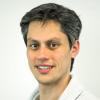When seeing the major pollution of the rivers in India in 2004 during his internship on parabolic solar cooking, Lindeboom decided to use his studies on Innovation management and Renewable energy for treating Water. Afterwards he ended up working for Kiwa Industry and Water, did his PhD at Wageningen University on Autogenerative High Pressure Digestion and worked as lecturer and researcher at Saxion Hogeschool on various energy and water related themes. Prior to his current position he was working as a post-doc at Ghent University in co-operation with the European Space Agency to build, operate and evaluate a futuristic pilot installation recovering hygienic water and nutrients from urine and shower water for long term manned Space missions. Here Lindeboom was the first on the planet to send and revive amongst others Anammox-bacteria after Space exposure.
In his current position he aims to tackle global challenges by developing Cyclical LOcal Sanitary engineering Solutions in Urban and Rural Environment (CLOSeSURE). His vision is to convert high-tech “often Western” systemic innovations from for example Space industry or Frugal innovation / “Jugaad” innovation from all over the planet to engineer modular and scalable frugal autarkic watertreatment systems and recover water and value-added byproducts for the “Bottom of the Pyramid”. With a focus on local resources and given the prevailing local conditions and his personal experience, integrating solar energy and autogenerative pressurised digestion into biological waste water treatment systems is an obvious choice. At ICFI Lindeboom is the Domain Program Developer Water/Energy.
Besides his academic career, he is fulfilling a part-time role as Chief Technology Officer at SEMiLLA Ipstar B.V., a small company, that has the mandate to transfer technology developed by the MELiSSA community to terrestrial applications.
More info on Lindeboom's academic endeavours can be found here:

